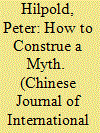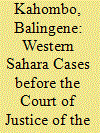|
|
|
Sort Order |
|
|
|
Items / Page
|
|
|
|
|
|
|
| Srl | Item |
| 1 |
ID:
170425


|
|
|
|
|
| Summary/Abstract |
In the recent case on non-cooperation of Jordan in the Al-Bashir case, the Appeals Chamber of the International Criminal Court for the first time invited on its initiative amicus curiae submissions by legal scholars. This comment focuses on the role of legal scholars as amici curiae. It argues that based on Martti Koskenniemi’s method on the structure of legal argumentation and analysis of the argumentation structure of several submissions by legal scholars in the Al-Bashir case, the role of legal scholars as amici curiae would better be viewed as grammarians capable of shaping the formulation of arguments of the Court. This view stands contrary to the traditional understanding that the amicus curiae participation can improve the court’s legitimacy by providing a neutral and definite answer to the legal dispute.
|
|
|
|
|
|
|
|
|
|
|
|
|
|
|
|
| 2 |
ID:
170421


|
|
|
|
|
| Summary/Abstract |
In the 19th century neutrality was a highly appreciated concept. In the 20th century it widely lost relevance and in principle it should be incompatible with UN membership. However, also under the UN system, some States have opted for neutrality and it can be argued that there is still space for this status within the universal peace order. In fact, this peace order is far from perfect. There are several lacunae in the prohibition of the use of force and this concept is open to different interpretations. New threats, such as international terrorism, are emerging that could threaten the absolute prohibition of the use of force. It is contended here that neutrals could play an important role when it comes to finding an interpretation of this prohibition that best could reconcile the goals of peace and security with the overall—still imperfect—structure of the UN system. These questions are analysed with primary reference to Austrian neutrality which on the one hand seems obsolete but on the other is forcefully looking for a new meaning.
|
|
|
|
|
|
|
|
|
|
|
|
|
|
|
|
| 3 |
ID:
170420


|
|
|
|
|
| Summary/Abstract |
The paper argues that digitalization primarily presents a methodological challenge for international legal scholarship. Three developments are relevant in this context: the datafication of law, computerized information retrieval, and the differentiation of legal knowledge. International legal scholarship has benefited from treating legal texts, legal relationships as well as legal interactions and decision-making “as data”. Typically, quantitative methods used on this data include text mining, network analysis, cluster analysis, and regression analysis. While data-driven scholarship cannot replace a hermeneutic approach to international law, it is likely to change the dimensionality of legal research, require adaptations of the law school curriculum, and enhance the interdisciplinary connectivity of international legal scholarship.
|
|
|
|
|
|
|
|
|
|
|
|
|
|
|
|
| 4 |
ID:
170422


|
|
|
|
|
| Summary/Abstract |
This paper studies the first compulsory conciliation proceeding under Article 298 and Annex V of the United Nations Convention on the Law of the Sea. It assesses the competence and conciliation proceedings in a comprehensive manner, with a view to understanding how conciliation may contribute to settling maritime boundary disputes. This paper reviews the conciliation commission’s interpretation of Article 281, Article 298(1)(a)(i) and other relevant provisions of Annex V to UNCLOS, and discusses the question of whether a pre-existing treaty between the parties can preclude resort to compulsory conciliation under Article 298(1)(a)(i), a question largely left unanswered by the commission. Furthermore, this paper examines the conciliation proceedings and the outcomes in the light of the law of maritime delimitation.
|
|
|
|
|
|
|
|
|
|
|
|
|
|
|
|
| 5 |
ID:
170424


|
|
|
|
|
| Summary/Abstract |
The International Criminal Court relies on its State Parties to incorporate, or implement, its constituent instrument, the Rome Statute, into their domestic legal systems to enable its effective functioning. First, State Parties are obliged to give effect to their explicit obligation to cooperate with the Court under the Rome Statute. Second, although not required to do so, to avoid their national legal systems being found by the Court to be unable to investigate and/or prosecute the crimes under its jurisdiction in accordance with the principle of complementarity, they should also implement the definition and prohibition of these offences in their national legal frameworks. This article appraises the status of the domestic implementation of the Rome Statute, both crimes and cooperation, in Asia. The article concludes that few Asian State Parties to the Rome Statute have incorporated the treaty’s provisions into their domestic laws in a holistic manner, with the absence of cooperation legislation, enabling State Parties to assist the Court, particularly striking.
|
|
|
|
|
|
|
|
|
|
|
|
|
|
|
|
| 6 |
ID:
170423


|
|
|
|
|
| Summary/Abstract |
This paper reviews the relevance of the Western Sahara cases brought before the Court of Justice of the European Union to international law. These cases relate to the contestations of the consistency of a number of economic agreements concluded between the European Union (EU) and the Kingdom of Morocco, as well as the EU acts that approved them, with the Treaty on the European Union (TEU) and the Treaty on the Functioning of the European Union (TFEU). The issues arising from these disputes include the legality of the Court’s jurisdiction to review the validity of a treaty which is already in force between parties and the rules of international law that the contested legal instruments have violated, perhaps entailing their invalidity under EU law. While the Court has rightly found that none of the aforementioned agreements is applicable to Western Sahara—since their territorial scope does not extend to a territory which is not subject to Moroccan sovereignty——this paper tries to answer a different question as to whether the Court’s decisions are in line with international law. It is demonstrated that though the Court’s competence to rule on the validity of EU unilateral acts is obvious, the establishment of its power to review the validity of a treaty which is in force, such as the fisheries agreement of 2006, is dubious because of the inconsistency of such power with the Vienna Convention on the Law of Treaties. In any event, the question which remains to be solved—and which was not submitted to the Court—pertains to the determination of the effects of the illegal application of the EU-Morocco agreements to Western Sahara on the rights of its people. It is concluded that such an application has violated the law of occupation and eventually international human rights law. These violations do not touch upon the validity of the contested legal instruments but relate to the question of responsibility for a wrongful act stemming from the illegal application of those agreements to occupied Western Sahara in a manner which is harmful to the interest of its people.
|
|
|
|
|
|
|
|
|
|
|
|
|
|
|
|
|
|
|
|
|